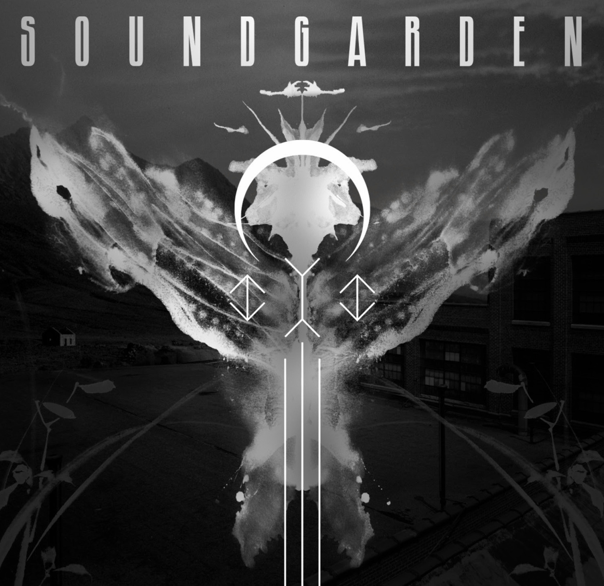Soundgarden's Kim Thayil Talks 'Echo of Miles,' a New Collection of Originals, Covers and Oddities

Since the release of their excellent 2012 reunion album, King Animal, Soundgarden have been spending some time revisiting their storied past.
In 2013 came a remastered reissue of 1990’s Screaming Life/Fopp album, itself a compilation of two late-Eighties EPs. Then, earlier this year, in recognition of the 20th anniversary of 1994’s Superunknown, the band released updated versions of the landmark album, including a five-disc “Super Deluxe” edition that included demos, rehearsals, B-sides and more from the sessions.
Now, Soundgarden have essentially raided their own vaults for the new Echo of Miles: Scattered Tracks Across the Path, a three-disc release that gathers together rarities under three headings: An “Originals” disc presents Soundgarden compositions that have appeared as B-sides, on soundtracks or other compilations or that have remained unreleased; a “Covers” disc collects their interpretations of other band’s songs from over the years; and “Oddities” includes remixes and other bizarre musical moments from the band’s history.
Soundgarden guitarist Kim Thayil has been hinting at a project of this scope for years, and the finished product is a virtual treasure trove of goodies, as well as essential listening for any Soundgarden completest.
Just prior to the release of Echo of Miles, Thayil sat down with Guitar World to discuss this trip through Soundgarden’s lesser-known past—and also talk about what’s coming up in the near future.
GUITAR WORLD: Echo of Miles is the Soundgarden compilation album that we’ve been hearing you reference for years. Now it’s finally here.
Yes. This goes back at least 20 years. Of course, I’ve never referred to it as a compilation…although it is a compilation. [laughs] But I tend to think of a compilation as songs that have appeared on albums, or things that are arranged for other purposes, like greatest hits records, or best of’s. Or, back in the Fifties and Sixties they made “rocking” albums and “candlelight” albums.
Get The Pick Newsletter
All the latest guitar news, interviews, lessons, reviews, deals and more, direct to your inbox!
But this is kind of a banding together of a bunch of songs that were non-album tracks, with the exception of a couple songs that were on greatest hits compilations. But the band has never been that thrilled about producing things like B-sides, or material for international releases, or songs on movie soundtracks. You know, we enjoy being on movie soundtracks but we also want these songs to be part of a Soundgarden album.
You’ve divided the material into three separate discs: Originals, Covers and Oddities.
Basically it’s three albums. And we contemplated releasing the three albums in a serialized fashion, perhaps over months, or maybe over a longer period of time. But we thought that ultimately we’d release them all at once. But that’s one of the strange things about this [project]. In my liner notes I had a hard time establishing the identity of this kind of an album. It’s a collection, but 20 years ago I perceived “Originals” as being ultimately another Soundgarden studio album.
Because they were loose ends—a song here, a song there. And these were all songs that we loved, because we went through the whole birthing process of writing them, learning them, recording them, mixing them. If we went through that entire process it’s because we believed in a song. And then to see that song as part of an EP that was released only in Japan was a little disappointing. We would have loved to have put those types of songs on an album here.
But, of course, back in the day, with Louder Than Love, Badmotorfinger, Ultramega OK, we would orient our recordings toward vinyl and a single disc. So we were limited to only putting 11 or 12 songs on an album. Starting with Superunknown we oriented toward CD. And, if you notice, everything since then on vinyl is a double album—Down on the Upside, Superunknown, King Animal. We decided we were not going to force ourselves to omit material. So that was kind of the impetus for this.
When you were putting this material together was there anything that jumped out at you or surprised you?
There’s a lot of material that jumped out. The covers album…I really enjoy the way the covers album is set up, the way the songs flow, and listening to some of the performances. Because when we originally did many of those songs we would self-critically compare them to the original versions that we were covering. And you’d always say, “Well, I’m not playing guitar like this guy…” “Maybe this is sloppier…” “I think Chris [Cornell, vocals] is doing something here the original singer wasn’t doing…” Things like that.
You’re always evaluating your performance against the original. But given this much time, I can now listen to these covers independently and not have to juxtapose them against the originals and see the flaws. Now I see them standing on their own as being standout performances by Soundgarden. The stuff with Ben [Shepherd, bass] in the band, or some of the early John Peel stuff with Hiro [Yamamoto, original bassist] in the band, it’s all very good.
And it surprised me and impressed me that I could appreciate these covers on that level. There’s the whole session of recordings that includes [the Rolling Stones’] “Stray Cat Blues,” [Black Sabbath’s] “Into the Void,” the Devo song “Girl U Want,” “Touch Me” by [Seventies British pop group] Fancy—those were all done pretty much in, like, one day. And the guitar styles are so different from each other. We’re doing Devo, and then an hour later Black Sabbath. Then the Rolling Stones. Then Fancy, which, as far as the guitar playing, is reminiscent of Mother Love Bone. And I’m playing all the guitars on all these tracks in one day. It was fun and it was funny to have to do all these different styles and colors. And it’s like, How could we do that so easily when at other times we struggled with our own songs?
Let’s talk about the song “Storm,” on the “Originals” disc. It’s a new song but also an old song. Can you talk about the history of that one?
There are individual songs within this collection that have strange stories, and “Storm” is one of them. Chris wrote a demo of it in ‘85 that had some weird vocals and guitar effects. There was no real guitar part but there was a cool bass line. Then he showed it to the band, and Hiro interpreted the bass line into something pretty much like a bass solo, and I wrote those guitar parts with the seventh chords, some ninths in there, some other things.
And our drummer at the time, Scott Sundquist, interpreted the drums as, like, rolling thunder. And locally, we played that song live all the time. It was a favorite—I know our peers in Green River, Mother Love Bone, Nirvana, Skin Yard, Melvins, all these bands we played with all heard the song because it was always in our set. Then when we got Matt [Cameron, drums] in the band we started writing new material, so a lot of the old material got pushed back. We tried doing “Storm” with Matt and it was a little bit of a different feel, so it kind of went from heavy rotation to medium rotation to low rotation. And that was it. It kind of got shelved.
So how did it come off the shelf?
We thought about how we never gave this song a good studio recording. So we decided to try it. We had some spare time, and then in May [producer] Jack Endino was available. He was the one who was so acquainted with our early material, and he loves this song so we thought we’d give him a chance at recording it. So it’s a brand new recording of a song we haven’t played live since ‘86 or ‘87. For all practical purposes it’s a new song, but it’s also something from 30 years ago.
I know you’re also currently working on a reissue of [1988’s] Ultramega OK. When will we see that? And is there any new material from Soundgarden on the horizon?
Well, a couple weeks ago Jack Endino and I finished up the remaining songs for Ultramega OK. It sounds way better, bigger and warmer than the original. We’re gonna sit on it for a few months and let everyone else hear it, see how we feel about it. We pulled the record from SST so it belongs to us now. So we’ll have to negotiate a new contract with a label and then we’ll hopefully put it out within a year. As for new material, when Soundgarden gets back from Australia in February and Matt’s Pearl Jam obligations are done, we’ll get together again. We’ll definitely start working on new music in 2015, for sure.


Rich is the co-author of the best-selling Nöthin' But a Good Time: The Uncensored History of the '80s Hard Rock Explosion. He is also a recording and performing musician, and a former editor of Guitar World magazine and executive editor of Guitar Aficionado magazine. He has authored several additional books, among them Kurt Cobain: Montage of Heck, the companion to the documentary of the same name.
Ozzy Osbourne’s solo band has long been a proving ground for metal’s most outstanding players. From Randy Rhoads to Zakk Wylde, via Brad Gillis and Gus G, here are all the players – and nearly players – in the Osbourne saga
“I could be blazing on Instagram, and there'll still be comments like, ‘You'll never be Richie’”: The recent Bon Jovi documentary helped guitarist Phil X win over even more of the band's fans – but he still deals with some naysayers











